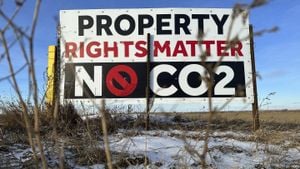A growing crisis is brewing in Palestine as electricity prices have surged significantly, leaving many families struggling to make ends meet. The Palestine Energy Authority has reported hefty increases due to new tariffs imposed by the Israeli government, creating severe financial pressure on Palestinian consumers.
According to reports, the recent tariff hikes began affecting families across the Palestinian territories, including the West Bank and Gaza Strip. With many households relying on electricity for basic needs, the impacts have been immediate and harsh.
Mohammed al-Omari, spokesperson for the Palestine Energy Authority, expressed concern for the families affected by these changes. He remarked, "Families will struggle to afford their bills as prices have spiked and it’s unsustainable." The rise, which highlights underlying issues with energy supply and operational costs, has sparked widespread frustration among residents.
The situation has prompted public outrage, with many voicing concerns over their ability to maintain their standard of living. "The people are angry, and we need immediate solutions to this crisis," shared Fatima Idris, one local resident who finds it increasingly difficult to manage her household expenses amid the dramatic price increases.
This electricity price crisis is emblematic of broader tensions surrounding resource distribution and rights in the region. Community activist Ahmed Sabha weighed in, stating, "This is not just about electricity; it’s about our basic rights to live normally." His remarks resonate with many who feel their dignity is being compromised by rising costs for basic services.
Reports indicate the price increase stems from changes to energy supply agreements, leading to rising operational costs. The Palestinian Authority is facing pressure to find urgent remedies to alleviate the burden on its citizens. Local leaders and activists are calling for negotiations and interventions to address the unsustainable situation.
The urgency of this crisis reflects broader socioeconomic pressures felt across the region, particularly against the backdrop of increased living costs. For many Palestinians, the right to access affordable electricity is becoming increasingly difficult, posing questions about social equity and governance.
The hike has provoked discussions within the Palestinian government and civil organizations about how best to manage resources and negotiate with suppliers for fairer rates. Many fear what will happen if these issues remain unresolved, as financial anxiety looms over households struggling to cope with rising expenses.
Activists and organizations working on behalf of Palestinian rights have stressed the need for international attention on the matter. Local leaders argue for transparency and accountability from both Palestinian leadership and the Israeli government to work toward sustainable solutions.
This rising electricity price crisis not only places heavy strain on individual families but also highlights the vulnerabilities within the larger infrastructure supporting Palestinian life. Immediate dialogue and actions are needed to prevent exacerbation of this urgent humanitarian crisis.
Moving forward, stakeholders within Palestinian governance must prioritize addressing the factors contributing to price increases. They must advocate for the rights of their people to access affordable electricity as part of their fundamental needs.
The rising costs of electricity serve as a stark reminder of the broader challenges facing Palestinian society. Without effective measures, many residents could find themselves facing insurmountable obstacles to maintaining their households.
How this crisis is handled will define the response to immediate and future needs across Palestine. The community's resilience is being tested, but their voices are growing louder, demanding change for sustainable living conditions.



